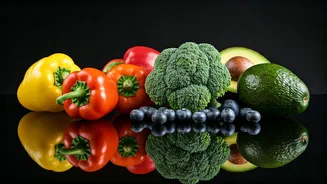Power Up: Grains
Grains are an excellent source of carbohydrates, which are essential for providing the body with energy. Athletes need a consistent energy supply to sustain
their training and competitions. Whole grains, in particular, offer a slow release of energy, which helps maintain stable blood sugar levels and prevents sudden energy crashes. Foods like brown rice, oats, and whole-wheat bread should form the foundation of an athlete's diet. These choices support sustained energy for endurance and power activities. Choosing complex carbohydrates from whole grains over simple sugars can significantly enhance performance. Regular consumption of these grains ensures the body has a reliable energy source to meet the demands of rigorous physical activities.
Protein for Repair
Protein is the building block of muscles and tissues, playing a vital role in recovery and repair after exercise. Intense training can cause muscle breakdown, and protein helps rebuild and strengthen these tissues. Athletes should ensure they get adequate protein intake from sources such as lean meats (chicken, turkey), fish (salmon, tuna), eggs, and plant-based options like lentils, beans, and tofu. This supports faster recovery, allowing athletes to train more consistently. Consuming protein after workouts is especially important to aid in muscle repair and growth. The right protein intake helps reduce muscle soreness and promote efficient recovery processes, enabling athletes to perform at their best consistently.
Fruits: Natural Energy
Fruits are packed with vitamins, minerals, and natural sugars, offering a quick and sustained energy boost. The sugars in fruits, such as fructose and glucose, provide an immediate source of energy, while the fiber helps regulate sugar absorption, preventing energy spikes and crashes. Fruits also contain essential nutrients that support overall health and enhance the immune system. Bananas, apples, oranges, and berries are excellent choices for athletes. Bananas are particularly beneficial due to their potassium content, which helps prevent muscle cramps. Fruits offer essential hydration and vital nutrients that boost overall health and ensure optimal bodily functions that aid in athletic performance and recovery.
Veggie Powerhouse
Vegetables are rich in vitamins, minerals, and antioxidants, crucial for maintaining overall health and supporting athletic performance. They help protect the body from damage caused by intense physical activity. Vegetables also play a key role in supporting the immune system and reducing inflammation. A diverse intake of colorful vegetables, such as spinach, broccoli, bell peppers, and carrots, provides a wide range of essential nutrients. These nutrients help improve energy levels and muscle function. Incorporating a variety of vegetables in the diet supports optimal bodily functions that enhance endurance and speed recovery times.
Healthy Fats
Healthy fats are essential for various bodily functions, including hormone production and the absorption of fat-soluble vitamins. Contrary to popular belief, fats are not the enemy of athletes. Healthy fats, such as those found in avocados, nuts, seeds, and olive oil, provide sustained energy and support overall health. These fats can help reduce inflammation, which is vital for recovery and preventing injuries. Including healthy fats in an athlete's diet can improve performance by providing long-lasting energy and supporting the absorption of essential nutrients. Incorporating these foods ensures the body receives the necessary building blocks for optimal performance and recovery, contributing to long-term health and athletic success.
Hydration is Key
Proper hydration is crucial for peak athletic performance. Dehydration can lead to fatigue, muscle cramps, and reduced performance. Athletes need to consume sufficient fluids throughout the day, especially before, during, and after exercise. Water is the primary source of hydration, but electrolyte-rich sports drinks can also be beneficial, particularly during intense or prolonged activities. These drinks help replenish electrolytes lost through sweat. Monitoring hydration levels by observing the color of urine is crucial. Pale yellow urine indicates good hydration. Staying well-hydrated ensures optimal energy levels, aids in muscle function, and enhances overall performance, allowing athletes to train and compete at their best.



















